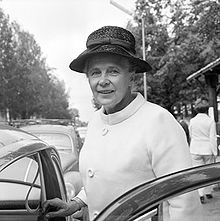Alva Myrdal
This article needs additional citations for verification. (November 2013) |
You can help expand this article with text translated from the corresponding article in Swedish. (November 2012) Click [show] for important translation instructions.
|
Alva Myrdal | |
|---|---|
 Alva Myrdal in Tierp in 1968. | |
| Born | 31 January 1902 |
| Died | 1 February 1986 (aged 84) Danderyd, Sweden |
| Nationality | Swedish |
| Occupation(s) | politician, sociologist |
| Spouse | |
Alva Myrdal (Swedish: [ˌalːva ˈmyːɖɑːl]; née Reimer; 31 January 1902 – 1 February 1986) was a Swedish sociologist and politician. She received the Nobel Peace Prize in 1982. She married Gunnar Myrdal in 1924.
Biography
Born in Uppsala, she first came to public notice in the 1930s, and was one of the main driving forces in the creation of the Swedish welfare state. She coauthored the book Crisis in the Population Question (Template:Lang-sv with Gunnar Myrdal in 1934). The basic premise of Crisis in the Population Question is to find what social reforms are needed to allow for individual liberty (especially for women) while also promoting child-bearing, and encouraging Swedes to have children. With architect Sven Markelius she designed Stockholm's cooperative Collective House in 1937 with an eye towards developing more domestic liberty for women.
A long-time prominent member of the Swedish Social Democratic Party, in the late 1940s she became involved in international issues with the United Nations, appointed to head its section on welfare policy in 1949. From 1950 to 1955 she was chairman of UNESCO's social science section—the first woman to hold such prominent positions in the UN. In 1955-1956 she served as a Swedish envoy to New Delhi, India, Rangoon, Burma (Myanmar) and Colombo, Ceylon (Sri Lanka).[1]
In 1962 Myrdal was elected to the Swedish parliament, and in 1962 she was sent as the Swedish delegate to the UN disarmament conference in Geneva, a role she kept until 1973. She participated in the creation of the Stockholm International Peace Research Institute, becoming the first Chairman of the governing board in 1966. In 1966 she was also named consultative Cabinet minister for disarmament, an office she held until 1973. A vocal supporter of disarmament, Myrdal received the Nobel Peace Prize in 1982 together with Alfonso Garcia Robles. In 1983 Myrdal effectively ended the heated controversy over the future of Adolf Fredrik's Music School, "The AF-fight" (Swedish: AF-striden).[2]
She is the mother of Jan Myrdal, Sissela Bok and Kaj Fölster.
She died the day after her 84th birthday.
See also
References
- ^ "Biografie Alva Myrdal". 50 Klassiker der Soziologie, Universitat Graz. Retrieved 2013-11-22.
- ^ Lutteman, Elisabeth (2006). Musikklass - ett pedagogiskt spänningsfält (PDF) (B.A.) (in Swedish). Luleå Tekniska Universitet. pp. 7–8. ISSN 1402-1773. Retrieved 2014-12-14.
{{cite thesis}}: Cite has empty unknown parameter:|1=(help)
- Hirdman, Yvonne (2008). Alva Myrdal: the passionate mind. Bloomington: Indiana University Press. ISBN 9780253351326.
Further reading
- Myrdal, Alva & Klein, Viola, Women’s Two Roles: Home and Work. London: Routledge and Kegan Paul, 1956.
- Etzemüller, Thomas, Alva and Gunnar Myrdal. Social Engineering in Sweden, Lanham: Lexington Books, 2014
External links
- 1902 births
- 1986 deaths
- People from Uppsala
- Ambassadors of Sweden to India
- Ambassadors of Sweden to Myanmar
- Ambassadors of Sweden to Nepal
- Ambassadors of Sweden to Sri Lanka
- Swedish Social Democratic Party politicians
- Nobel Peace Prize laureates
- Uppsala University alumni
- Swedish Nobel laureates
- Women members of the Riksdag
- Women Nobel laureates
- Women sociologists
- Swedish sociologists
- Jawaharlal Nehru Award laureates
- Members of the upper house of the Riksdag
- 20th-century women scientists

